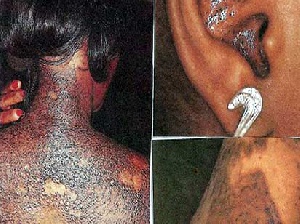Skin bleaching is a common practice especially among women in their desire to have a lighter complexion which tends to correlate with attractiveness. The most popular active ingredient in skin bleaching products is hydroquinone.
However, ever since it became known that hydroquinone causes skin ochronosis and possibly cancer, it has been banned in Asia, all European Union Countries, all East African countries, South Africa, and lately in the Ivory Coast. Because the Ghana FDA has not acted, Ghana has now become dumping grounds for toxic hydroquinone products. All the “displaced” manufacturers are sending their toxic products to Ghana and selling them at very low prices. Coincidentally, the more hydroquinone one puts in a product, the faster it bleaches the skin but the more it corrodes the skin giving it all kinds of colorations.
While 2% hydroquinone causes minimal skin damage, most of the skin lightening products in Ghana contains 5% to 8% hydroquinone to cause maximum damage. The situation has grown so bad that some manufacturers are criminally adding as much as 5% hydroquinone to cocoa butter creams to lighten skin and they are getting away with it.
In August 2015, the FDA held a meeting with all stakeholders that sell hydroquinone products and advised them of the FDA’s decision to enforce the ban of hydroquinone in Ghana with effect from August 1, 2016. This announcement was echoed by the international press and Ghana was highly praised for taking this bold step. However, I suspect due to the upcoming elections, the FDA decided not to ruffle any feathers that would make the then government unpopular. So August 1, 2016, came and passed without any action by the FDA. The new bold leadership of the FDA met with stakeholders in April 2017 and advised that it is finally going to enforce the ban of hydroquinone in Ghana. This announcement is yet to be published by the Ghanaian press or the FDA to make the citizens aware of what is coming up.
The ban of hydroquinone was enacted by the FDA as far back as in the year 2006. However, anytime the FDA declared its intention to act on the hydroquinone ban to protect the health and safety of Ghanaians powerful forces, mostly politicians and party bigwigs, intervene and stop the FDA from acting. Yes, this is a tough issue because many livelihoods depend on the hydroquinone products. However, Ghana is a country of laws and an illegal act cannot be allowed to be perpetuated just because some people derive their livelihood from it at the expense of the health and safety of the citizens. It is the duty of the FDA to protect the citizens from dangerous food, cosmetic, and drug products. In carrying out this mandate, the health and well-being of the citizens should supersede any other interests or political considerations. The Ivory Coast has successfully banned hydroquinone. Ghana can certainly do better.
One may want to know if there is an alternative to hydroquinone in skin lightening creams. Yes, there are lots of safe and effective natural plant extracts that also lighten the skin. These active ingredients have been tested for both safety and effectiveness and are currently being used in countries where hydroquinone is banned. The only difference between the hydroquinone creams and the natural lightening creams is the price. The hydroquinone creams are harmful, more effective, and, cheaper. Most people without the knowledge of the dangers of hydroquinone will choose the cheaper alternative at the cost of their health and that is exactly what is happening in Ghana.
The purpose of this article is to praise the new management of the FDA for having the courage to act and also start a public discussion of the hydroquinone problem in Ghana. As demonstrated by the Lands Minister, the NPP government has the courage to act to protect the health of the citizens of Ghana regardless whose ox is gored and regardless of the political consequences. It is my hope that the FDA will stand firm in its commitment to the people of Ghana and not allow the powerful forces to clip their wings again. That would be contrary to the spirit of law enforcement that the NPP government has established by controlling the galamsey business.
By: Osei Akwasi
Washington DC, USA.
Health News of Friday, 28 April 2017
Source: Osei Akwasi
Feature: Skin bleaching, hydroquinone and the FDA
Entertainment
















